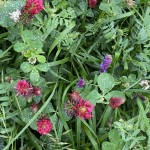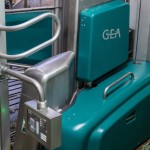The World's First 100% Electric, Zero Fossil Fuel Cherry Farm
Added one year ago
By Elizabeth-Marie Nes

In Central Otago, New Zealand, a transformation is taking place at Forest Lodge Orchard, where Mike and Rebecca Casey, along with their business partners Euan and Rachel White, have turned their cherry farm into a model of sustainability and innovation. Their journey from city life to becoming pioneers in the electric farming industry is reshaping the landscape of traditional agriculture.

In 2019, the Caseys, armed with no prior farming experience but a passion for renewable energy, purchased a property with 9 hectares of land, aiming to escape the hustle of city life. The decision to plant 9250 cherry trees marked the beginning of a journey towards creating a carbon-neutral orchard. However, a study by Environmental Accounting revealed that traditional diesel-powered technology in cherry farming emitted significant carbon emissions.
Undeterred, the couple set out to revolutionise their farm by electrifying almost every aspect of their operations. The initial challenge was the diesel irrigation pump, which was replaced with an 18.5kW electric pump powered by a solar and battery system designed in collaboration with Cromwell-based company Infinite Energy. Despite the hurdles, including the need for a grid upgrade costing over $100,000, the Caseys succeeded in making their orchard almost entirely electric.

Frost fighting, a critical aspect of cherry farming, posed another challenge. The couple imported two 30kW electric fans from South Africa to replace diesel-consuming alternatives. The financial viability of the electrification project initially had a payback period of 11-12 years, but with the rising cost of diesel, the payback period has now reduced to nine and a half years.
Operating under the consumer brand NZ Zero, Forest Lodge Orchard successfully sold its cherries at a 15% premium to a boutique supermarket chain in Auckland. This premium, coupled with the commitment to zero fossil fuels, is expected to bring the payback period down to under two years once the orchard reaches full production.
The orchard employs the Upright Fruiting Offshoots (UFO) system, minimising water and fertiliser wastage between trees. Forest Lodge Orchard also adopts an innovative approach to power management, utilising a custom computer program that buys and sells power based on spot prices.
In recognition of their groundbreaking efforts, the orchard's project was honoured at the 2021 Sustainable Energy Association of New Zealand (SEANZ) Energy Awards, where Infinite Energy was recognized for the best grid-connected renewable system.
Looking ahead, the Caseys envision a future where their orchard serves as a real-world demonstration of the potential of electric technology in agriculture. With the impending arrival of New Zealand's first fully electric tractor, Forest Lodge Orchard is poised to achieve its primary goal of zero fossil fuels in a season and a net-zero energy bill for an entire season.
As Forest Lodge Orchard continues to thrive without burning fossil fuels, it stands as a testament to the viability of sustainable farming practices, setting the stage for a greener and more efficient future for agriculture in New Zealand and beyond.
Operating costs
Fossil fuel
Frost-fighting $21,600
Irrigation $10,260
Vehicle $15,604
Tractor/ vehicles $10,590
Line charge $1000
Electric (grid)
Frost-fighting $1860
Irrigation $3402
Vehicle $5,375
Tractor/ vehicles $1204
Line charge $12,500
Electric (grid, solar/battery)
Frost-fighting $300
Irrigation $549
Vehicle $867
Tractor/vehicles $194
Line charge $4000
Join the conversation
Be the first to leave a comment.
Leave a comment
All comments are reviewed before they are published on the website. Your email address will not be published.




Family-Owned Farm Embraces Regenerative Agriculture to Grow and Educate


